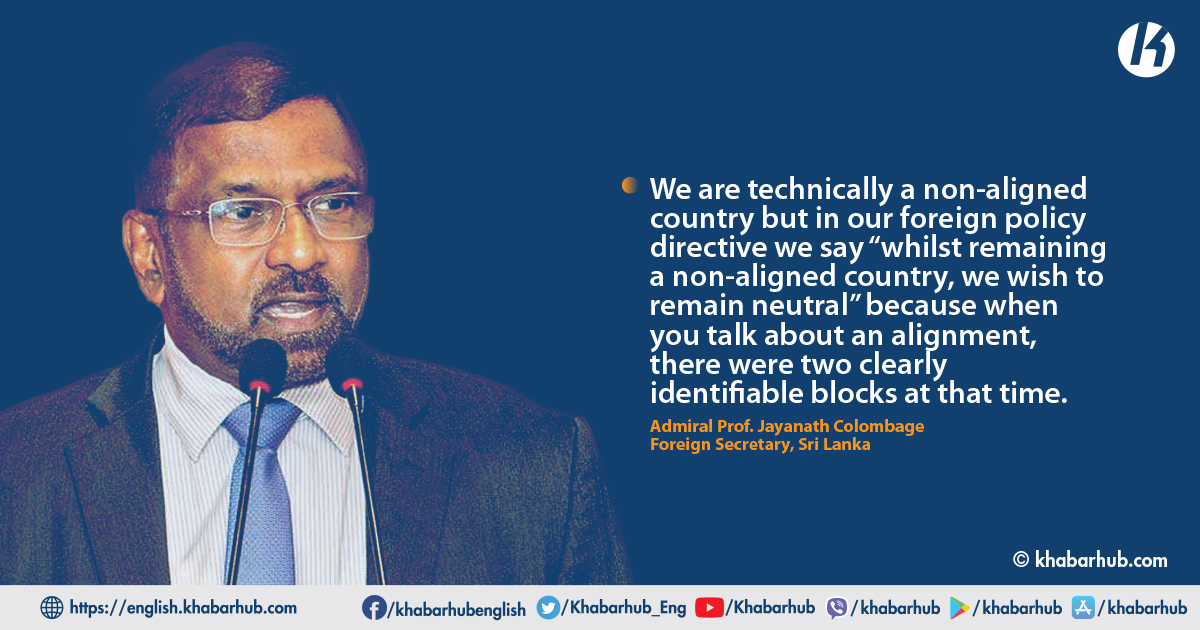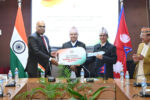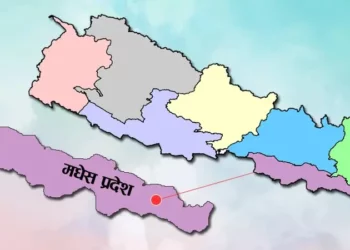Admiral Prof. Jayanath Colombage is the Foreign Secretary of Sri Lanka. He has served the Sri Lanka Navy for a period of 36 years and retired as the Commander of the Navy.
He is the 18th Commander of the Sri Lanka Navy and was decorated for gallantry and commended for exceptional service to the Navy.
Previously he was Additional Secretary to the President for Foreign Relations. He holds a Ph.D. from General Sir John Kotela-wala Defence University (Sri Lanka).
He also holds MSc in Defence and Strategic Studies from Madras University and MA in International Studies from Kings College, London.
He is a visiting lecturer at the University of Colombo, Defence Services Command and Staff College (Sri Lanka), Kotela-wala Defence University, Bandaranaike Center for International Studies and Bandaranaike International Diplomatic Training Institute.
He is a Fellow of Nautical Institute, London UK. Admiral Colom-bage is a Guest Professor at Sichuan University and Leshan Normal University in China and an adjunct professor at the National Institute of South China Sea Studies, Haikou, China.
In addition. He has been a guest lecturer in several key universities and training institutes in Bangladesh, India, Japan and Pakistan.
He has also been an editor and reviewer of a number of internationally renowned academic journals. In addition, he has served as the Director-General of the Institute of National Security Studies Sri Lanka as well.
Dr. Pramod Jaiswal, Strategic Affairs Editor at Khabarhub, spoke to Admiral Prof. Jayanath Colombage on Sri Lanka’s Foreign Policy, Maritime Security of the Indian Ocean and Nepal- Sri Lanka relation.
For the first time, the Foreign Ministry of Sri Lanka together with the Office of the President has drafted the “20-point basic Foreign Policy directive”. How do you assess the Government’s new policy framework? Will it help Sri Lanka in achieving its goals and confront the many contemporary challenges it faces in the international sphere?
As you rightly mentioned, for the first time in our 73 years of history, we have written down foreign policy formula, which is supposed to guide the work of our missions abroad and how we deal with the international organizations, multilateral organizations, and bilaterally.
And one of the main ideas of this foreign policy directive was to shift our focus more towards economic diplomacy.
Because right now the Sri Lankan economy is not doing very well and we believe we have the potential to do better. We believe our missions and foreign ministry should work even harder to get more investment, technology, and training to the country and also to promote our products and businesses overseas.
So, economic diplomacy was a key focus of the 20-point foreign policy directives for 2020 and beyond. At the same time, based on the geostrategic situation in the Indian Ocean region that Sri Lanka has been experiencing for the last so many years, we want to be very clear about what our foreign policy affiliation is.
For example, we are technically a non-aligned country, but in our foreign policy directive we say “whilst remaining a non-aligned country, we wish to remain neutral” because when you talk about an alignment, there were two clearly identifiable blocks at that time. But right now there isn’t anything as such.
Therefore, we feel that the major powers and the aspiring major powers in the Indian Ocean region want other countries to join them, bandwagon them, work with them, ally with them.
We didn’t want to do that. We just wanted to remain neutral. And also, again maintain friendly relations with all the countries purely for economic prosperity.
So, as you can see, the two main focuses on the 20-point foreign policy directive, one is economic diplomacy and another one is how do we address the geo-strategic situation prevalent in the Indian Ocean. therefore, we believe this is the way forward for Sri Lanka in the foreseeable future.
Indian External Affairs Minister Dr. S Jaishankar made a three-day visit to Sri Lanka in January after the virtual summit between Prime Minister Narendra Modi and Prime Minister of Sri Lanka Mahinda Rajapaksa in September 2020. How do you view the recent engagement between Sri Lanka and India? Does it signify India’s growing interest to further ties with Sri Lanka?
India has a neighborhood-first policy, and when India is having the neighborhood-first policy, we also should have a similar reciprocal policy.
So, in our international relations, so far as strategic relations are concerned, it is India-first. We give priority to India’s strategic security environment and India’s security concerns.
The visit by the Foreign Minister Jaishankar, then National Security Advisor Ajit Doval, the talks between the leadership, are all normal things.
These are very positive signs indicating Sri Lanka and India are both interested in enhancing bilateral ties. Because we believe, Sri Lanka is a relatively small country in comparison to India; in size, population and economy.
But, in geostrategic terms, Sri Lanka is very important to India. Vice versa, India is also critically important to Sri Lanka on geostrategic terms. So, therefore, this is a mutually beneficial relationship and we have no choice anyway.
We should not antagonize India in any way. We should not be a strategic security concern to India in any way. India has a large population, nearly 600 million middle class and is one of the fastest-growing major economies in the region.
So, we need to capitalize on that. Whilst maintaining our sovereignty and independence, we also need to benefit from India, we need to work together with India.
So, these facets are critically important. Of Course, because of COVID19, traveling between India and Sri Lanka was not possible as we would have wanted to. But these facets are important. Even during the COVID19, some high-level visits took place. So, this is important for both countries.

How do you view the great power contestation in the Indian Ocean region, particularly the aspirations of China, India and the USA? What ramifications can it have in the coming days in the region and in Sri Lanka?
Sri Lanka is the country wherein every day we feel this strategic game being played. For some, we are the chessboard, they can come and play games.
For some, we are the soccer field. They come and play the game. So, we do witness this strategic competition being played on the soil of Sri Lanka on a day-to-day basis.
Whatever we do, whether it is vaccine diplomacy, whether it is an investment, whether it is maritime security, there is a component of this geostrategic competition in the Indian Ocean.
Now, in the Indian Ocean, India is the big residential power, but China is also pretty much an Indian Ocean power now. China is in the Indian Ocean in a big way.
Of course, the USA with the preeminent military power has been in this region for a long time and they are still there.
So, the Indian Ocean is the focus or the center of attraction of all these major players. Everybody wants to scum, everybody wants to stay, everybody wants to play the game in the Indian Ocean for different reasons, for different strategic, economic, or security reasons.
So, we do see this game played in the Indian Ocean on a day-to-day basis. Unfortunately, we are within the spheres of influence of all these major powers, we are in the axis of influence of all these major powers, it coincides in Sri Lanka.
Therefore, in geostrategic terms, Sri Lanka has gone up in a very big way because of this focus or attraction of major powers.
If you look at the geography, Sri Lanka is the Southernmost landmass of South Asia or even for that matter the whole of Asia, we are the southernmost tip in the Indian Ocean.
And very close to Sri Lanka pass is the viscous East-West shipping lane of the world, which accounts for roughly fifty percent of world containers, seventy-two percent of world energy and thirty-five percent of world bulk cargo.
Ironically, these figures are not necessarily for us. These are extra-regional trade. So, therefore, the net energy importers like Japan, China, even India and for trade; the Indian Ocean is the artery.
The Indian Ocean is the heart of ocean trade today and Sri Lanka is located just 12km north of that trade route. So, therefore, we are in a very important location.
But these important locations are also a curse because the attraction is too much. And the battle is played here, so that is why we wish to remain neutral.
What should be done to overcome the mistrust and the trust deficiency in the Indian Ocean Region? With Sri Lanka’s growing strategic importance, what role can Sri Lanka play in maintaining peace and security in the region?
Well as you rightly said, one of the most important aspects of relations in the Indian Ocean is ‘mistrust’ and ‘lack of trust’.
We don’t trust each other at all. That is why SAARC, which was created a long time ago with a lot of aspirations, is somewhat in hibernation today, and SAARC is, even now, the least economically integrated region in the world.
Why is this so? Because we have so much mistrust among South Asian countries. So, there is a huge trust deficiency across the Indian ocean.
As I mentioned earlier, Sri Lanka is growing in strategic importance, so how we leverage this strategic importance into economic gains will determine the future of our country.
Due to COVID19, most of the economies are battered. Sri Lanka is one of the worst-hit countries due to the pandemic which has been raging across the world. Hence, we have a problem here in Sri Lanka and we have to play our cards very carefully.
Whilst we give priority in the strategic security space to India, that does not mean we deal only with India. We have to deal with every country in the region, who are interested in the region, either residential or non-residential, and try to benefit from them; but whilst maintaining our strategic autonomy, whilst maintaining our neutrality, whilst maintaining non-aligned status.
It of course is a very difficult task because for a small country; not economically or militarily powerful, it is very difficult to play this game, however, that is the only way out for Sri Lanka.
So, Sri Lanka should not bandwagon with one country against the other or one group of countries against another, we should not hedge one country against the other and try to benefit from both, rather we must try to maintain balanced relations with everyone, we must try to maintain strategic autonomy that will work well for the economy and the people of Sri Lanka.
Therefore, we have to play a role in the Indian Ocean, believing we are at the center of the Indian Ocean. We have to play a role in promoting maritime security, ensuring the peace and stability of the region and safety, because not only peace and stability, but the safety of life at sea is of critical importance.
As everyone might be aware, during the month of May, Sri Lanka witnessed one of the worst maritime disasters in its history.
Thus, maritime safety is important, maritime security needs to be informed and maintaining peace and stability is important, maintaining sea lines of communication across the Indian Ocean is important. In all these aspects, Sri Lanka, though a small country, can play a major role by using or exploiting its geostrategic location.
You announced that Sri Lanka will soon be assuming the role of Vice-Chair of Indian Ocean Rim Association (IORA) in the latter part of 2021, and thereafter Chair for the tenure of 2023 to 2025, Maritime Safety and Security. With Sri Lanka also being the founder of the Indian Ocean Rim Association (IORA), how does it plan to carry out its responsibilities leading the Indian Ocean Rim Association Working Group on Maritime Safety and Security?
I do have a lot of confidence and a lot of hope on IORA, as I mentioned there are many countries interested in the region and every major country comes to the Indian Ocean with its own strategy, it could be the Indo-Pacific strategy, free and open Indo-Pacific strategy, or something else belonging to the major powers.
Unfortunately, the Indian Ocean does not have its own strategy, where is the Indian Ocean strategy? Now is the time we work through IORA, the Indian Ocean Rim Association, which encompasses a large portion of Indian ocean veterans and even some outside players as observers and dialogue partners to design and develop an Indian ocean strategy in order to maintain, what I mentioned earlier, the sanctity of the sea lines of communication, security and safety.
Therefore, we firmly believe that Sri Lanka is currently leading the formulation of policies for maritime safety and security because if we look at the past thirty years, Sri Lanka was engaged in an armed conflict that had an ocean-going component.
The sea tigers which we battled, had attacked air crafts, logistics crafts and merchant fleet. They did everything, terror financing, money laundering, human smuggling, narcotic trading, gun smuggling; so, Sri Lanka gained a lot of experience fighting with them on maritime security.
Being located in close proximity to the sea lines, Sri Lanka has a lot of experience in maritime safety as well. Moreover, we are determined to make this policy recommendation and make it work.
Unfortunately, because of COVID19, the progress of IORA could not be fast-tracked the way we hoped but sooner than later pandemic will be behind us so we need to be prepared, we need to do our planning now, do our studies now and have things ready to implement when COVID19 is over.
We do believe in IORA and have great confidence in IORA, we are certain that this is the right platform for the future of the Indian ocean mainly for maritime security, safety and prosperity.

The Government of Sri Lanka took a decision to not sign the Millennium Challenge Corporation (MCC) Compact based on the petitions that cited MCC as a threat to the country’s sovereignty and national security. In your view, was it the sole reason why the Sri Lankan government did not proceed ahead with the agreement?
Public Opinion! That is my short answer. You see we are a democratic country, we all are, you are a democratic country, we are a democratic country.
In a democracy, the west has to recognize and respect the same principles applied in their countries are applicable here also.
There is no point talking about MCC now because it is something in history. It was supposed to be a grant but when it came to the surface there was a huge public debate in the country regarding certain clauses in it.
There were arguments against and for it and then the people decided that they do not want it even if it is a grant as there were many perceptions, viewpoints, and arguments claiming that it jeopardizes and endangers the sovereignty of Sri Lanka.
I will not go into detail about this because there was a commission appointed to study the MCC and their reports concluded that Sri Lanka should not accept it.
The previous governments from 2015 to 2019, wanted to do it but they themselves disagreed on the contents of MCC during the latter part.
Unfortunately, it befell the government that came to power in 2019, it was not their creation but it came to their responsibility and finally, this government, based on public opinion, decided not to go ahead.
So, this is a very difficult situation to explain, a grant of USD 480 million, why should a small economy like Sri Lanka reject it?
That is a question but I think though we are a small country, the sense of national pride and national sovereignty is very valuable and it is uncompromising for us.
I am sure it is the same for Nepal, it is uncompromisable. We can’t compromise our national pride, our national security and national sovereignty. Although it was a grant it did not succeed.
Sri Lankan Airlines recently launched a direct air flight from Kathmandu to Colombo. With this new development in Nepal-Sri Lanka relations, how do you see the impact it will have on connectivity and tourism between the two countries?
Nepal is a country that many Sri Lankans consider with the highest respect and regard. It is revered as the birthplace of Lord Buddha because Sri Lanka is a majority Buddhist country, nearly seventy-two percent of Sri Lankans are Buddhist.
So, one of their dreams is to come to Nepal and visit Lumbini (the sacred place where Lord Buddha was born) before they die. That is the lifetime dream of many Sri Lankan Buddhists. So, we hold Nepal in very high esteem, very high level.
And we feel that Nepal is like Sri Lanka, a small country with a small economy, struggling to come out of the shackles of the past and to move on.
So, therefore, the feelings among Sri Lankans about the people of Nepal are really high. Now, it is time to take another step forward and take the people-to-people contact to another level. Nepal, however, isn’t the closest neighbor of Sri Lanka. Nepal is really close to the Himalayas and we are at the Southern tip of India.
So, there’s quite a long distance. So, the best way is air travel. To enhance people-to-people connectivity, bilateral cooperation and linkage between the two countries, air travel is of critical importance.
Therefore, Sri Lankan Airlines, the new air passage between our two countries will definitely help. Now, the airlines can have a flight, so the people and government have to make it happen, make it viable, make it more beneficial for both countries.
The potential of cooperation between the two countries is great. Both countries can cooperate on tourism, investment, small and medium enterprises, and agriculture et al. I am hopeful that this airline or new flight will definitely help in achieving that goal of enhanced bilateral, people-to-people connection between Nepal and Sri Lanka.
Sri Lanka has long been trying to cement ties with countries associated with Buddhism. How can Buddhism serve to draw Nepal and Sri Lanka together and act as a tool to bridge their relations? How can Nepal and Sri Lanka pursue their ties further in terms of Buddhism?
Buddhism is a great religion in this part of the world. It was started in Nepal and came to India and from India, it went all over the world especially towards the East.
I think today in this 21st century, where we have mistrust, a non-forgiving attitude, and where we try to dominate others, the teaching of Lord Buddha should be used as a bridge to bring people closer together.
Although Lord Buddha was born in Nepal, Nepal is not a majority Buddhist country, right? But we can work on what we have; commonalities, the linkages, what we have between our two countries.
Buddhism can be one very important tool to create linkage between our two people. In the same way, the Indian government is giving a very important place to Buddhism. Indian PM Modi has promised to allocate around USD 13 million to develop Buddhist pilgrimage sites in Sri Lanka.
That’s a great thing. Because this is our heritage, this is our history, this is our culture. Our countries have a great history and a great culture.
We believe in religion, we believe in gods. So, we don’t want to harm other people. We don’t believe in fighting, invading, attacking. We are very peace-loving people.
This has been inculcated in us through the religion that we believe, whether it is Hinduism, whether it is Buddhism, or Christianity or Islam.
These are the four main religions that we have. Therefore, we must use whatever common bonding between our two countries for the betterment of our two countries and carry it forward to the region. We have a very conflicting region.
Sometimes we feel as if we are sitting in a volcano waiting to erupt as we have two of the Nuclear power’s enemies, India and Pakistan and then of course China is another nuclear power in this region. Then, the US, France and the UK are nuclear powers in the region.
Similarly, North Korea, not very far, is aspiring to have nuclear power. So, we are in a very difficult situation. So, we need to patch up. We need to heal.
Buddhism is a great religion, it is a great philosophy. It is a complete way of life. It teaches you how to live. It teaches you how to respect the environment. It teaches us to develop good qualities.
These are good things coming from a religion that is common to the people of Nepal and the people of Sri Lanka.
Thus, we must grab that, we must cultivate that, we must promote our relations through that. Because for me it is very low-hanging fruit. We can just pluck it because it’s just there. That’s one way to look at it.









Comment